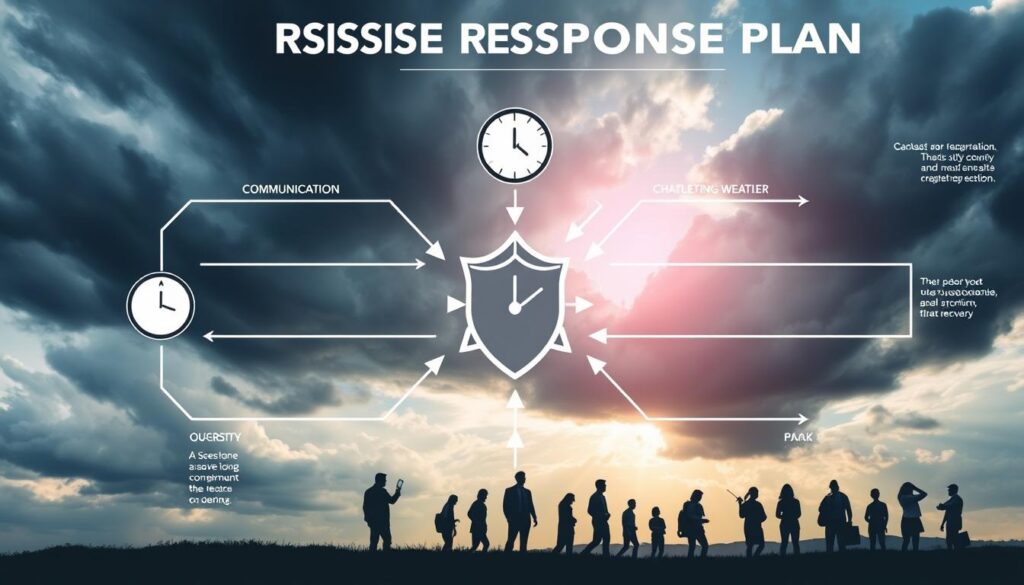When disaster hits, can your business handle the storm of customer reviews? Today, managing your online reputation is key to crisis management. This guide shows how to handle reviews during tough times, keeping your brand strong and turning negatives into growth chances.
Crises can surprise businesses, from natural disasters to global health crises. In these hard times, focusing on customer experience is crucial. Using online review responses is a strong way to keep in touch with customers and the community. It’s not just about fixing problems; it’s about building trust and loyalty when it counts the most.
Did you know? 59% of businesses have faced a crisis, but only 54% have a plan ready1. Not having a plan can cost a company 22% of its business if customers see one negative review on the first page of search results1. This shows how important a good review response plan is during crises.
Reviews greatly affect what consumers buy. A huge 93% of people say online reviews help them decide where to spend their money2. This fact shows how important it is to keep a good online image, especially when times are tough. By answering reviews well, businesses can change how people see them, rebuild trust, and come out stronger from a crisis.
Key Takeaways
- Crisis management plans should include review response strategies
- Prompt and personalized responses are crucial during challenging times
- Negative reviews can significantly impact business revenue
- Online reviews heavily influence consumer purchasing decisions
- Effective review responses can turn casual buyers into loyal customers
- A proactive approach to crisis management is essential for business resilience
Understanding the Importance of Review Response During a Crisis
In times of crisis, businesses face big challenges in keeping their reputation and customer trust. Review response is key for managing reputation and handling crisis communications. Over 50% of businesses see their brand reputation and customer trust drop after a crisis3.
Our online presence is crucial during tough times. Companies that quickly respond to online reviews and social media comments tend to build a strong online reputation and loyal customers4. This shows our dedication to making customers happy and helps lessen the crisis’s negative effects.
Crisis situations can really hurt businesses. Companies might lose up to 30% of their customers after a crisis, and unhappy customers often switch to competitors3. To avoid this, we must talk openly and honestly, give regular updates, and be easy to reach for our customers.
Handling reviews well during a crisis means keeping an eye on online talks and answering both good and bad comments. This helps shape how people see us online and deals with customer worries early4. By doing this, we can lessen disruptions, protect our stakeholders, and keep our business reputation strong, even when things get tough.
Bad reviews can really affect us more than good ones4. That’s why it’s important to ask happy customers for good reviews and quickly and kindly address any negative feedback. By focusing on these crisis communication strategies, we can get through tough times and come out stronger.
Preparing Your Crisis Review Response Strategy
Creating a strong crisis response plan is key for managing reviews well during tough times. We must set up a team, clear ways to communicate, and templates for different situations. This way, we can quickly and consistently handle unexpected events.
Our customer service should focus on being empathetic and open. Today, 77% of consumers check online reviews before choosing local businesses5. So, having a crisis plan ready for both good and bad reviews is vital.

For our marketing, knowing that 82% of people trust social networks for buying tips5 is crucial. By using tools to watch reviews on various platforms and setting up alerts for crisis keywords, we can answer fast and well.
Our proactive reputation management should be personal. Personalized responses keep things consistent and feel more human6. This is key since 74% of customers reviewed local businesses last year5.
| Review Type | Response Guidelines |
|---|---|
| Positive | Thank by name, reference specific positive aspects, highlight crisis-related efforts, create anticipation for future visits |
| Negative | Concise empathetic response, apologize, acknowledge crisis limitations, suggest offline conversation, show proactive attitude |
The first 60 minutes of a crisis are crucial in shaping how it’s managed and seen5. With a detailed crisis review response strategy, we can better handle tough times and keep customer trust.
Key Principles for Responding to Reviews in a Crisis

When a crisis hits, it’s key to balance empathy with professionalism in your responses. Start by acknowledging the issue and apologizing sincerely. This can boost trust by up to 40%7.
Then, give clear, timely updates on the situation. Being open is crucial – don’t dodge or dismiss concerns. Instead, keep your audience informed through emails, social media, and your website. Doing so can increase engagement by 30%87.
Showing empathy is crucial in how you respond to reviews. Understand and address customers’ worries directly. This can make people feel more positive about your brand by 25%7.
When it’s right, offer solutions or compensation. Helping customers with support and resources can keep 20% more loyal customers after the crisis7. Always follow up on any promises you make.
Keep your brand’s voice consistent but adjust to the situation’s sensitivity. For tough issues, suggest talking offline. These steps help build trust and keep your professionalism, even when things get tough.
“In times of crisis, our response to reviews becomes a testament to our commitment to our customers.”
Using review response templates can help streamline your efforts. They’re a good starting point for both good and bad reviews, ensuring your crisis communication is consistent.
Crafting Empathetic and Transparent Responses
In times of crisis, it’s key to show empathy and be clear. We know how vital it is to listen to customers and show real concern. We also need to give clear updates on the situation.

When we answer reviews during tough times, we use a friendly tone. We talk directly to customers and tackle their specific points. This shows we care about their experiences and builds trust. We skip making excuses and focus on fixing things and meeting customer needs9.
Being open is crucial in tough times. We tell the truth about what we can and can’t do. We highlight our efforts to keep services good. This honesty shows we listen to customers and aim to get better, even when it’s hard.
“Our values guide us through crises, reinforcing trust and demonstrating our commitment to integrity and customer satisfaction.”
Here are some examples of how to respond to reviews with empathy and openness:
- Acknowledge the issue and its impact
- Express sincere apologies when needed
- Outline steps we’re taking to fix the problem
- Offer personal solutions or help
- Give contact info for more help
By using these ideas, we can make responses that fix immediate issues and strengthen our relationships with customers. Remember, clear values make decisions easier, especially in tough times. They also make our company culture clear in every interaction9.
| Crisis Response Element | Impact on Customer Experience |
|---|---|
| Empathy | Builds emotional connection |
| Transparency | Increases trust and credibility |
| Action-oriented solutions | Demonstrates commitment to resolution |
| Personalization | Shows individual customer value |
Handling Negative Reviews During Challenging Times
Negative feedback during a crisis can be overwhelming. We’ve seen businesses face up to 30 new 1-star reviews in a single day during spam review events10. This surge in negative reviews can significantly impact a company’s online reputation. For instance, one restaurant’s Google review score plummeted from near-perfect to less than 2 stars with around 1,200 1-star reviews within 24 hours10.
To handle customer complaints effectively, businesses need a robust crisis management strategy. First, respond promptly to limit potential damage. Customers often leave negative reviews shortly after a negative experience, so quick action is crucial11. Acknowledge the customer’s frustration and apologize for any shortcomings. Be honest about how the crisis has impacted operations, but avoid making excuses.
Review moderation plays a key role in managing your online reputation. Regularly monitor reviews to identify patterns and address systemic issues. In cases of fraudulent reviews, report them to the platform. We’ve seen how effective this can be – one restaurant’s rating recovered to 4.5 stars after invalid reviews were removed within 72 hours10.
Reputation marketing involves turning challenges into opportunities. Use negative feedback to showcase your commitment to customer satisfaction. Offer solutions or compensation when appropriate, and invite customers to discuss concerns offline. Remember, your response to negative reviews can positively influence potential customers reading the exchange.
“A crisis doesn’t build character, it reveals it. How you handle negative reviews during challenging times can define your brand’s reputation.”
By implementing these strategies, businesses can navigate through crises and maintain a positive online presence, even in the face of negative reviews.
Leveraging Positive Reviews to Rebuild Trust
Positive reviews are key for rebuilding trust and keeping a good brand image during tough times. Saying thank you to these reviews shows we care about our customers and their happiness. It also shows our dedication to making things right.

Research says 85% of customers trust online reviews as much as they trust advice from friends12. This trust makes positive feedback very valuable for companies wanting to fix their reputation. Sharing these good reviews online helps turn customers into brand supporters and shows we’re strong when things get hard.
Talking to customers through reviews helps build strong bonds and a community feeling12. This is key when you’re trying to get trust back after a crisis. Saying you’re sorry and responding quickly and with empathy can make customers stick with you.
Using positive feedback to show off what we do well can lessen the effect of bad reviews13. We can learn from the good reviews to keep doing what works. This way, we balance out the bad reviews and show we’re always getting better and caring for our customers.
Real connections with customers are crucial for trust after a brand crisis13. By making changes based on what customers say and involving them in fixing things, we can build stronger, lasting relationships. These relationships can handle future problems better.
Conclusion
We’ve looked at how managing reviews is key during crises. It affects a company’s online image and growth. Being focused on customers helps us get through tough times. By quickly and kindly responding to reviews, companies can make things better14.
Being ready and consistent in our crisis plan is crucial. Did you know 94% of people might not visit a business with bad reviews? And 45% are more likely to go if the business talks back to criticism14. This shows how important it is to handle reviews well to keep customers trusting and loyal.
To get better at handling crises, we should think about using After Action Reviews (AARs) or Intra-Action Reviews (IARs). These tools help us check our work, find what works best, and fix problems fast15. By always getting better, we can tackle future crises better and grow our business over time.
In the end, managing reviews during crises is more than fixing problems. It’s a chance for businesses to show they care about making customers happy and always getting better. By thinking this way, we can come out stronger from challenges and keep strong bonds with our customers.
FAQ
Why is responding to reviews important during a crisis?
How can businesses prepare for responding to reviews during a crisis?
What key principles should guide review responses during a crisis?
How can businesses craft empathetic and transparent responses during a crisis?
What is the best approach to handling negative reviews during a crisis?
How can businesses leverage positive reviews during a crisis?
Source Links
- Crisis Management Plans and Strategies for Businesses – https://onlinemba.wsu.edu/blog/crisis-management-plans
- Tips for Responding to Positive Reviews with Reply Examples – https://broadly.com/blog/how-to-respond-positive-reviews/
- Crisis Management in Customer Relationships: Building Trust in Times of Trouble – https://www.earlyalert.com/customer-relationships-through-effective-crisis-management/
- Businesses Should Respond to Online Reviews – https://medium.com/@crisisPR/businesses-should-respond-to-online-reviews-2c5693856806
- How to Prepare for and Manage a Crisis – https://www.brandwatch.com/blog/crisis-management/
- 11 must-have review response templates during a crisis, emergency or disaster – Chatmeter – https://www.chatmeter.com/resource/blog/10-must-have-covid-19-review-response-templates/
- Enhancing Crisis Communication: Strategies for Effective Oil Spill Response | Oil Spill Response – https://www.oilspillresponse.com/knowledge-hub/crisis-management/ten-principles-of-crisis-communications/
- How to manage customer satisfaction in a crisis – https://www.zendesk.com/blog/how-to-manage-customer-satisfaction-crisis/
- How do you craft a crisis statement that is honest and empathetic? – https://www.linkedin.com/advice/0/how-do-you-craft-crisis-statement-honest
- Promoted Article – No Sweat: How to Handle a Google Reviews PR Micro Disaster // Local Marketing Insider #047 – https://forum.dealerrefresh.com/threads/no-sweat-how-to-handle-a-google-reviews-pr-micro-disaster-local-marketing-insider-047.9692/
- 16 Tips to Handle Negative Customer Reviews Online – https://www.searchenginejournal.com/tips-handling-negative-customer-reviews-online/353470/
- Customer Reviews: Key Point in Online Reputation Management – https://digitaldelane.com/the-importance-of-customer-reviews-in-online-reputation-management
- You’re facing a brand crisis due to negative online reviews. How can you rebuild trust with customers? – https://www.linkedin.com/advice/1/youre-facing-brand-crisis-due-negative-online-ygwrf
- Powerful Examples of How to Respond to Negative Reviews – https://www.reviewtrackers.com/guides/examples-responding-reviews/
- Emergency response reviews – https://www.who.int/emergencies/operations/emergency-response-reviews

